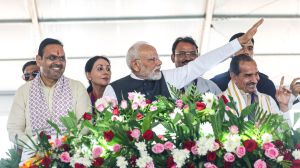India to tell Nepal King: Time to act tough
When Nepal’s King Gyanendra arrives here on an 11-day visit on December 23, India has a polite yet firm message for him: Strengthen the...

When Nepal’s King Gyanendra arrives here on an 11-day visit on December 23, India has a polite yet firm message for him: Strengthen the multi-party democracy and direct the army to take proactive action against Left-wing extremists.
Sources said that the diplomatic and security establishment was looking towards a candid conversation with the King. It is understood that New Delhi will ask King Gyanendra to instill confidence in the democratic polity and remove the suspicion in the minds of the political parties over the dealings with the Maoists. This, according to sources, can be only done if the Nepal Army shows visible action against the Maoists and recapture its lost influence on ground.
New Delhi is of the view that despite the Indian Army pumping in more than Rs 300-crore worth of hardware in Kathmandu and training the Royal Nepalese Army in counter-insurgency operations, not much has been done by the RNA to tackle the rampaging Maoists. This was clearly evident during the Kathmandu siege this year when the RNA waited for Maoists to call off the blockade rather than actually engage them.
New Delhi has now fine-tuned its Nepal policy and would frown upon any move by the Palace to destablise the political system any further. It wants the King to take urgent steps to bring the political parties to the table so that a strong multi-party democracy is at the helm of affairs.
South Block knows that it will be difficult to hold elections in Nepal in April next year due to the ongoing Maoist violence. The best option, therefore, is to simultaneously retrieve the security situation and pressure the political parties into getting their act together. Peace dialogue with the Maoists, according to sources, should only come after the political process has been kickstarted.
India has interests in Nepal’s security situation as the Left-wing extremists’ ideological brothers, now the Communist Party of India (Maoist), are expanding their operations in the bordering Uttaranchal, Uttar Pradesh and Bihar.
The King arrives in Delhi on December 23 along with wife Komal Rajya Laxmi Devi and Industries, Commerce and Supplies Minister Purna Bahadhur Khadka. He will meet the Indian leadership including President A.P.J. Abdul Kalam, Prime Minister Manmohan Singh, UPA Chairperson Sonia Gandhi, Foreign Minister Natwar Singh and National Security Advisor J.N. Dixit the next day. The King will then go on a pilgrimage to Uttaranchal, Uttar Pradesh, Bihar and West Bengal and returns to Kathmandu on January 2, 2005.




- 01
- 02
- 03
- 04
- 05


























